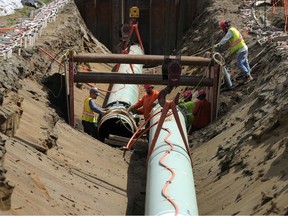
Article content On May 1, Trans Mountain pipeline expansion began shipping Alberta oil and bitumen through the Rockies to a tanker terminal on Burrard in Greater Vancouver. From there, the oil goes to refineries in Washington state and California, as well as China, South Korea and other Asian destinations. Before Trans Mountain, Canada shipped almost no oil to Asia.
Since May, we have been shipping about $325 million worth a month. Much more is possible over the next few months and years. In all, the pipeline has added almost 600,000 barrels a day to the amount of oil Canadian producer can ship by pipeline rather than railcar.
Already, it accounts for 17% of Canada’s oil export capacity and could help producers add 100,000 to 300,000 barrels each and every day to national oil production. That’s a lot of numbers tumbling out all at once, but suffice it to say, the Trans Mountain pipeline has already had a tremendously positive impact on Canadian oil production. Perhaps the most important impact: The price of Western Canadian Select, Canada’s equivalent of the well-known West Texas Intermediate (WTI) variant.
Before the pipeline to the coast was finished, Canadian producers’ only option was to sell to American refineries. And when you have only one customer, you become hostage to the deeply discounted price that buyer is willing to pay. American Gulf Coast refiners saw us coming, as it were, and often paid upwards of 15% less for our oil.
Western Canadian heavy oil is not the same quality as WTI. It’s slightly harder to refine. It will never fetch the same price as its Texas cousin.
But with other markets competing for our oil, over the next year or so the gap between Canadian and Texas oil should shrink. That’s all well and good for Alberta, but what about the rest of the country? In broad terms, the Bank of Canada expects Canada’s exports to jump nearly seven per cent this year, thanks in large part to Trans Mountain. That means people who work on the pipeline now that it is operational – technicians, engineers, environmental officers, trades people – plus people who manufacture spare parts, build trucks, run trains and operate restaurants, motels and apartments up and down the line will all benefit.
But so will truckers who haul supplies to the line, and professionals who provide legal, financial and accounting services. The Conference Board estimates as many as 12,000 people will be employed directly and indirectly by the line, with B.C.
, Alberta and Ontario being the biggest beneficiaries. Over the next 20 years, Canadian oil producers should make about $75 billion more than they would have without TMX. In addition, Canadian governments at all three levels should bring in about $50 billion in addition tax revenue.
That’s $2.5 billion a year, not even close to one year’s worth of deficits from the Trudeau government. But neither is it chump change.
Of course, the largest chunk of economic benefits falls on Alberta. Selling oil is our principal industry, just the way manufacturing is the principal industry of Ontario and Quebec. Alberta could see economic growth that is double the national average for the next two or three years.
But B.C. and Ontario should also beat the national average in part because of Trans Mountain.
Yes, TMX cost an ungodly sum of money to build, but that’s because it was built by a federal Crown corporation rather than a private company. Yet that doesn’t overshadow the positives from Trans Mountain. Indirectly, TMX shows how destructive the Trudeau Liberals’ obsession of “green” restriction have been to Canada’s economy.
Imagine how good our economy could be if the Trudeau Libs had let Keystone and Energy East pipelines go ahead, plus another line to sell LNG to Germany..










